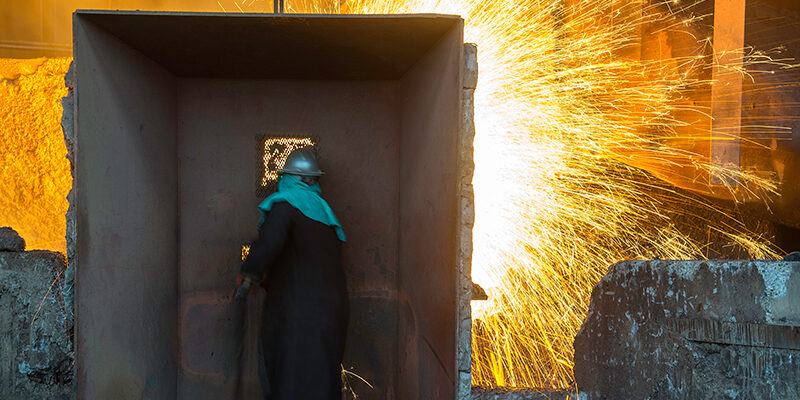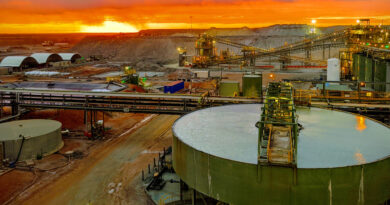Glencore claims its assets performed well in difficult circumstances
BAAR, Switzerland – Glencore, in its Full Year 2020 Production Report, states that its own sourced copper production of 1,258,100 tonnes was 113,100 tonnes (8%) lower than 2019, mainly reflecting Mutanda being on care and maintenance in 2020 (partly offset by Katanga’s successful ramp-up), with Covid-19 related suspensions being a much smaller factor.
Own sourced cobalt production of 27,400 tonnes was 18,900 tonnes (41%) lower than 2019, mainly reflecting Mutanda on care and maintenance. On a standalone basis, Katanga’s cobalt production was up 6,800 tonnes (40%).
Own sourced zinc production of 1,170,400 tonnes was 92,900 tonnes (9%) higher than 2019, mainly reflecting: (i) higher zinc content from Antamina (40,000 tonnes); (ii) improved output from the Mount Isa operations (27,800 tonnes); and (iii) the net positive effect of 18,700 tonnes from Other South America, owing to restarting the short-life Iscaycruz mine in Peru, offset by Covid-related suspensions and shutdowns.
Own sourced nickel production of 110,200 tonnes was 10,400 tonnes (9%) lower than 2019, reflecting Koniambo operating as a single-line operation for the majority of 2020, with Covid-related mobility restrictions affecting its maintenance schedule. The expected decline in grades at the existing Sudbury mines (INO) also contributed.
Attributable ferrochrome production of 1,029,000 tonnes was 409,000 tonnes (28%) lower than 2019, reflecting the South African lockdown and resulting suspension of smelting operations in Q2, with a phased restart thereafter. Lydenburg smelter has been placed on extended care and maintenance. The remaining four smelters were fully operational from Q4, resulting in materially higher quarter on quarter production.
Coal production of 106.2 million tonnes was 33.3 million tonnes (24%) lower than in 2019, reflecting the impacts of the pandemic via stopped or reduced work in Colombia and South Africa, extended care and maintenance at Prodeco, plus market-related supply reductions in Australia in H2 2020.
Entitlement interest oil production of 3.9 million barrels was 1.6 million barrels (29%) lower than 2019. Operated fields in Chad were placed on care and maintenance in March/April 2020 and are yet to be restarted, given continued pandemic-related challenges in international mobility (2.2 million barrels decrease). The balance reflects year over year production increases in Equatorial Guinea and Cameroon since new wells were drilled.
“Our mining assets performed well in difficult circumstances during 2020. Various precautionary operating changes made in Q2 continued into the second half, with sustainable and safe working practices embedded for the pandemic era. Production picked up accordingly, with year-over-year increases in zinc, gold and silver production,” sais Glencore Chief Executive Officer, Ivan Glasenberg.
“Excluding Mutanda (currently on care and maintenance), 2020 copper production was in line with 2019, while cobalt production was 6,200 tonnes higher, reflecting Katanga’s continued successful ramp-up to design capacity levels. Required Covid-19 related mandatory suspensions and international mobility restrictions significantly impacted 2020 production of ferrochrome in South Africa, oil in Chad and nickel at Koniambo. Furthermore, various proactive market-related supply reductions were initiated in H2 2020, primarily with respect to coal production from Australia.
“As noted at our recent 2020 Investor Update, we continue to progress portfolio optimisation, and, in this regard, recently agreed terms for the sale of Mopani to an existing minority shareholder. Work continues to advance options around other non-core assets within the Group.”
Glencore is one of the world’s largest global diversified natural resource companies and a major producer and marketer of more than 60 responsibly-sourced commodities. The Group’s operations comprise around 150 mining and metallurgical sites and oil production assets.
With a strong footprint in over 35 countries in both established and emerging regions for natural resources, Glencore’s industrial activities are supported by a global network of more than 30 marketing offices. Glencore’s customers are industrial consumers, such as those in the automotive, steel, power generation, battery manufacturing and oil sectors.
Glencore also provides financing, logistics and other services to producers and consumers of commodities. Glencore’s companies employ around 145,000 people, including contractors.




